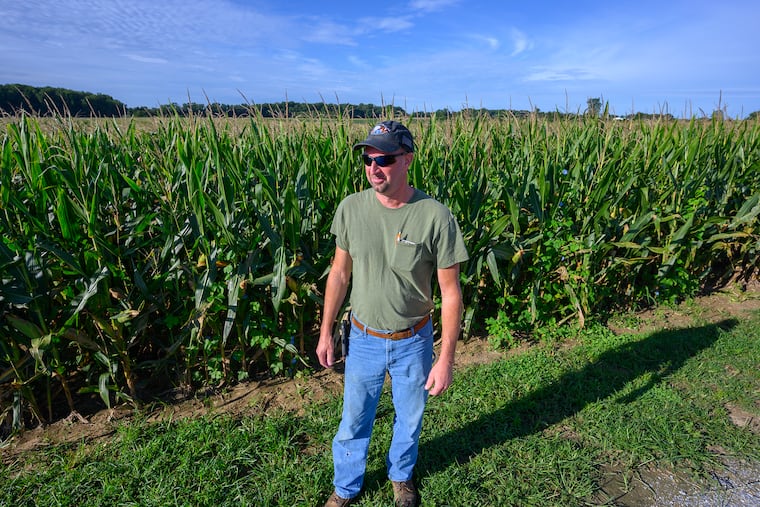New Jersey farmers fear big solar arrays will cause thousands of acres of prime land to vanish
A recently introduced N.J. Senate bill could alter the use of some of the Garden State’s most prime farmland by allowing large-scale solar arrays to be placed on thousands of acres.

The Dolbow family has farmed the rich soil of Salem County in South Jersey for so long that the road that runs along its cornfield is named after them.
But amid all the trials the family has faced over four generations of farming, David Dolbow, 52, sees something coming that could completely transform local agriculture: big solar.
“It’s definitely going to change the landscape,” Dolbow said of Bil-Dow Farm. What he fears most is the loss of thousands of acres of prime farmland to utility-scale solar systems.
“If you put solar on this land and take it out of production, you’re talking about tons of food that’s needed to feed the world,” Dolbow said. “People need to eat, and this ought to be the number-one priority.”
Dakota Power Partners has plans to erect 400,000 solar panels on 800 acres in Pilesgrove Township off Route 45, about eight miles from the Dolbows’ farm. The township planning board is reviewing the plans for the Nichomus Run Solar Farm, which calls for an electric substation.
Dakota says the project would provide enough electricity to power 24,000 homes and generate $1 million a year in local tax revenue. It plans a dual use of solar and 1,000 ewes for an operational sheep farm. The sheep would graze under and between panels.
Dolbow, whose family owns 127 acres of preserved farmland in Mannington Township, said a 300-acre solar project is being proposed much closer to his property — on land he leases as part of his operations. He is vice president of the Salem County Board of Agriculture.
Though big solar projects on farms already exist in New Jersey, new ones have been dormant since 2012 when legislation rolled back state incentives, making the projects economically unfeasible.
A bill sponsored by State Sen. Bob Smith (D., Piscataway), chairman of the Environment and Energy Committee, would change that by directing the state Board of Public Utilities to establish a utility-scale-size solar energy program with farmland as a component. The bill, introduced Aug. 25, defines utility scale as a facility capable of producing at least 10 megawatts of power.
The bill, which Smith said could change, would reintroduce incentives to encourage solar to be built on farmland and forests to try to meet the state’s aggressive plan of generating 17 gigawatts of solar power by 2035. Gov. Phil Murphy wants 100% of the state’s electrical power supplied by clean energy by 2050.
Installing ground-mount solar arrays on open space is one of the cheapest ways to accomplish that for consumers who ultimately pay for the power. But the idea rankles some environmentalists.
Michelle Byers, executive director of the New Jersey Conservation Foundation, said the bill would toss a law that currently steers solar arrays toward brownfields, landfills, rooftops, and parking lots.
“The proposed law would not only make it easier to build large, utility-scale solar arrays on the state’s best farmland, it would also allow forests to be clear-cut to make way for solar projects, which makes no sense,” Byers said in a statement.
The New Jersey Sierra Club hopes the state looks for space other than farmland and forests.
“As the scale of solar projects increases, it is important that New Jersey properly finds land for it,” Jeff Tittel, the club’s president, said in a statement. “We should use existing developments or brownfields, create sound barriers on highways, use barges, rooftops, ponds, and more as suitable sites for solar panels.”
Peter Furey, executive director of the New Jersey Farm Bureau, said the solar bill has the potential to change the landscape.
“We don’t want energy interests coming in and dictating to local planning boards,” Furey said. “We don’t want it on prime agricultural land. We think the debate is not finished.”
In general, the Farm Bureau’s board leans toward conservation of the land for agriculture.
“So 20 acres of solar would be no problem,” he said, “and 20 acres is a lot of solar panels. But it’s when you talk about hundreds of acres where it could be destructive.”
But Smith, the senator who proposed the bill, said he understands the concerns and wrote the bill so it would prohibit solar on preserved or environmentally sensitive land. Currently, the New Jersey Farmland Preservation Program has 238,283 acres enrolled. About 40,000 of those acres are in Salem County.
Smith said the state needs to help tackle climate change because of its vulnerable 133 miles of shoreline. It’s possible that a future version of the bill would prohibit solar projects on the state’s best farmland, but it’s unclear how many acres that would leave open for the state to achieve its goals. He also said it’s likely that mature forestland would also have restrictions.
In addition, Smith said he’s considering separate legislation to encourage more dual-use solar — having agricultural and electricity production on the same land. Though agricultural yields and electric output are lower in such installations, the compromise allows both to exist with a combined economic value more than either single use alone. Panels would also be erected higher to allow for more use underneath, Smith said.
Dolbow, the farmer, said his family has already faced a painful transition away from dairy in favor of corn, soy, and hay. Farms such as his are also under stress from tariffs initiated as part of a trade war with China.
“The farmer is probably the most optimistic businessperson in the world,” Dolbow said with a grin. “If you’re not optimistic, you should get out of the business. But we just want to see this land stay as farmland.”